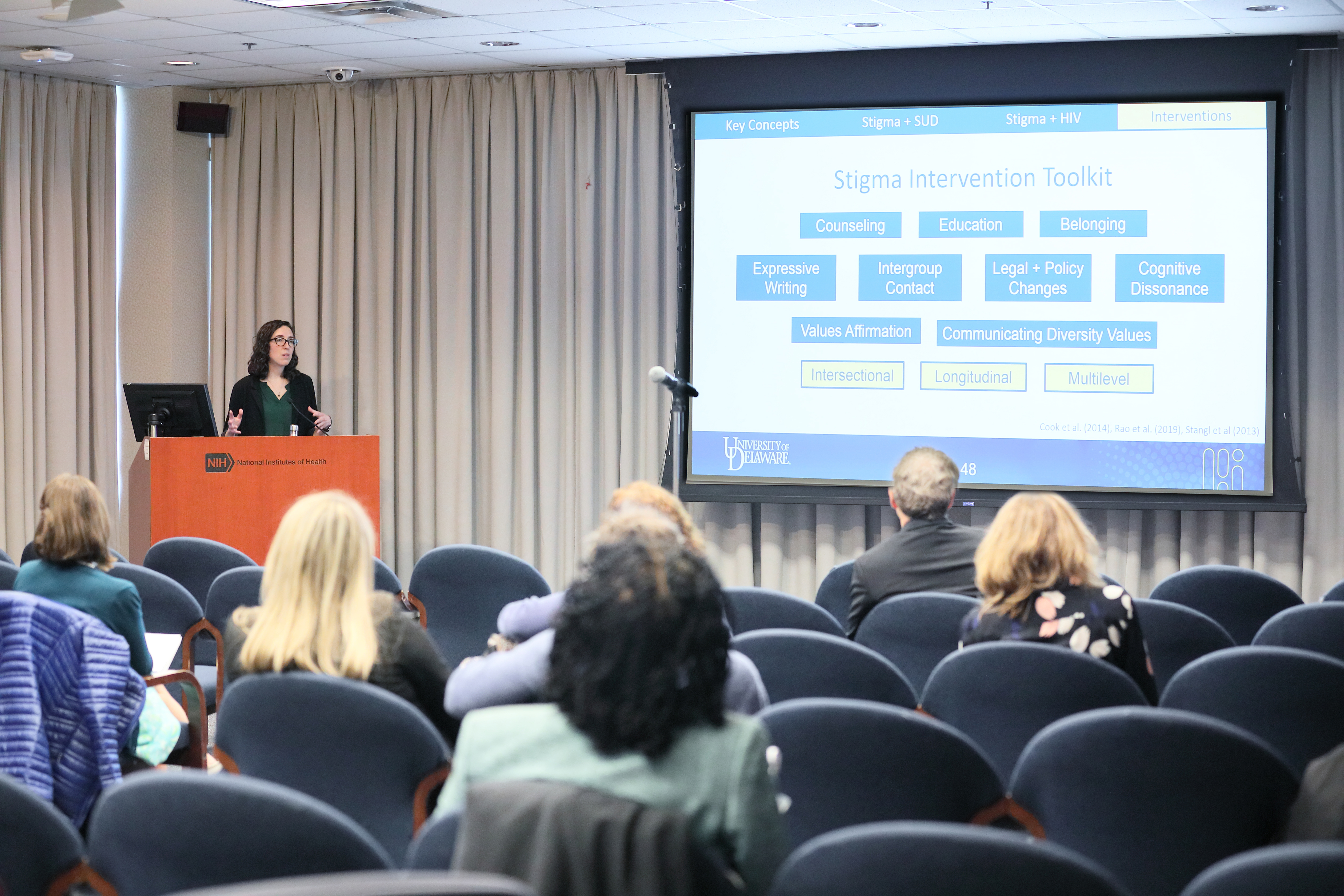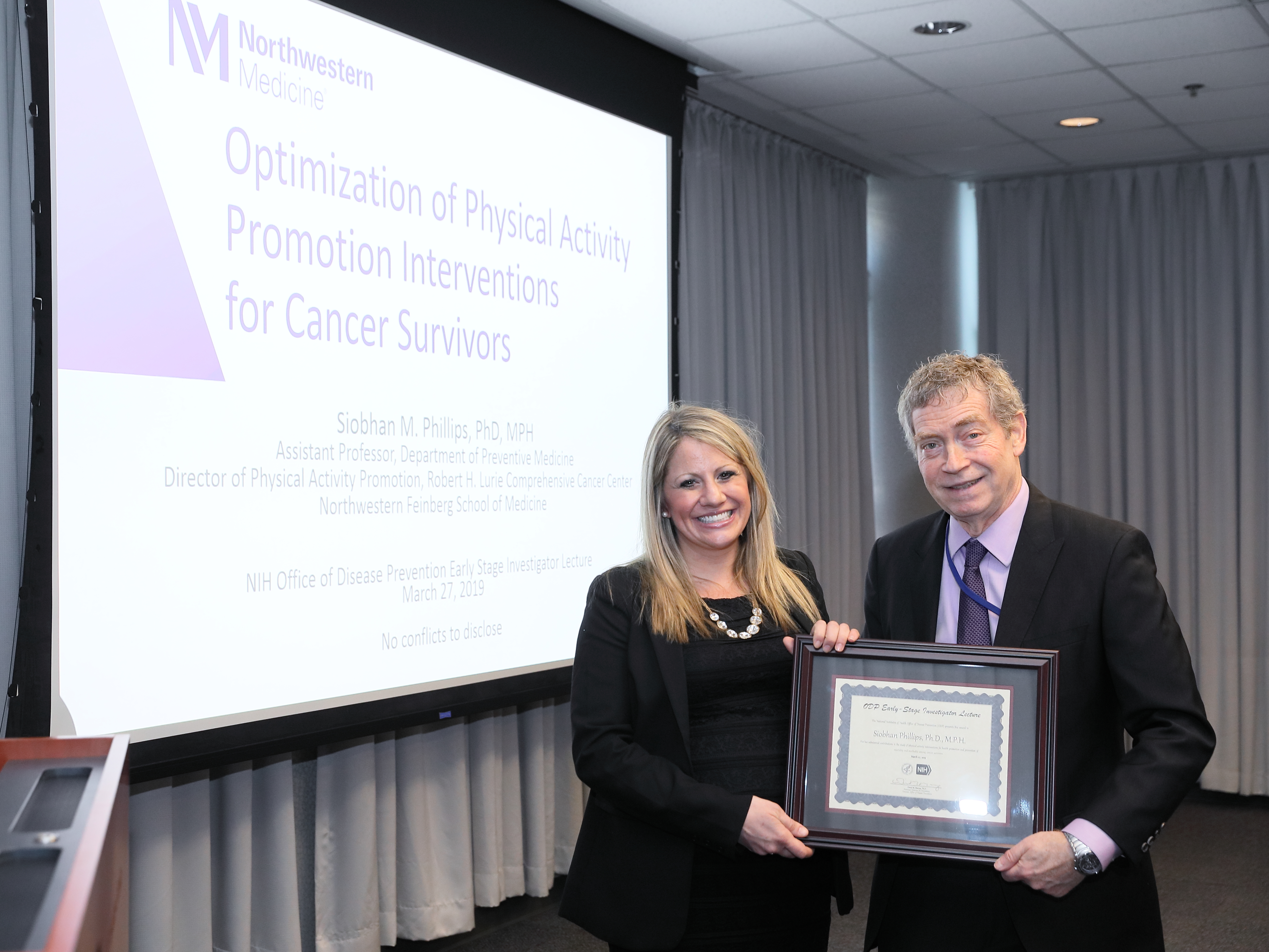The ODP Early-Stage Investigator Lecture recognizes early-career prevention scientists who have already made outstanding research contributions to their respective fields and are poised to become future leaders in prevention research, but who have not yet successfully competed for a substantial NIH-supported research project. The ODP selected two awardees in 2019:
- Valerie A. Earnshaw, Ph.D., is an Assistant Professor and Faculty Scholar in the Department of Human Development and Family Sciences at the University of Delaware.
- Siobhan M. Phillips, Ph.D., M.P.H., is an Assistant Professor in the Division of Behavioral Medicine in the Department of Preventive Medicine at Northwestern University Feinberg School of Medicine.
On March 27, 2019, Drs. Earnshaw and Phillips came to the NIH to present their work. We sat down with them for a conversation about how they arrived in their areas of research and what advice they have for graduate students and fellows looking to follow similar paths.
How did you get involved in prevention research—and, more specifically, your field of research?

Dr. Earnshaw
I went to graduate school at the University of Connecticut to study stigma. When I first got there, I was doing very traditional lab-based experimental social psych work. For example, putting women in rooms and doing a self-objectification manipulation—asking them to think about how they look to other people and seeing how this shaped their perceptions of themselves and others. Midway through, I realized that I was not connecting with this area of research, so I set out to find something I felt passionate about.
I knew that Dr. Seth Kalichman, at the University of Connecticut, was recruiting people to take their background in traditional social psych methodology and apply it to the field of HIV. I had a bit of exposure to HIV because my mom, who is a nurse, had a close friend when I was young who died of HIV. This was very upsetting first and foremost because he died, but also because he experienced a lot of stigma while in the hospital. This was in the late ‘80s, early ‘90s, and the providers did not want to touch him or interact with him. This was a vivid memory, and it made me interested in studying HIV stigma.
Following my time at the University of Connecticut, I applied and was accepted at Yale University as a postdoctoral student in the Center for Interdisciplinary Research on AIDS, which was a T32-supported program. It was a great experience because I was given the opportunity to begin collecting my own data within HIV research, continue to train in HIV research, and connect with HIV scientists globally.
Dr. Phillips
I started doing research as an undergraduate and was part of an honors program at the University of Illinois at Urbana-Champaign. I was given the opportunity to visit different research labs within the College of Applied Health Sciences. I went to the Exercise Psychology and liked both the work the lab was doing and the principal investigator, Dr. Edward McAuley, who ultimately became my advisor.
This lab focused on aging and physical activity. As I became more involved in the research, my interests narrowed in on physical activity and cancer. My mom was diagnosed with cancer when I was 10, so this had a personal interest to me as well. I knew I wanted to improve the quality of life and longevity in that population.
The F31 award I received while obtaining my graduate degree allowed me to do a study on cancer survivors, while also being involved in the work on aging that was happening in the lab.
After graduate school, I was accepted into a fellowship at the National Cancer Institute (NCI) where I completed an M.P.H. at Harvard—followed by 2 years on-site at the NCI where I worked in the Office of Cancer Survivorship and with the Implementation Science team. I chose this path because I was also interested in taking the results from randomized controlled trials and looking at how to translate it into practice.
What helped you the most in your career—a mentor, networking, etc.?
Dr. Earnshaw
I am very grateful for having had stellar mentors. I’ve given a talk to graduate students mapping out how I moved from institution to institution and showing how many of these mentors knew each other. Mentors are great for networking and helping you obtain your next opportunity. For example, when I applied for the postdoctoral program at Yale, the faculty member who was reviewing my application knew Dr. Kalichman, with whom I had worked, so they called him as a reference to inquire about my experience.
While I was at Yale, I continued to network. When I would attend conferences, I would always try to organize a symposium where I would give a talk and invite peers and at least one “reach” person, which is someone who I have not met but would like to network with. Then as a follow-up, I’d host a lunch to talk about the symposium but also to network with my “reach” person.
Dr. Phillips
I am very appreciative of my mentors who gave me a lot of opportunities and had a lot of faith in me and my work. They helped me navigate throughout all the phases of my career. I still call my Ph.D. and postdoctoral mentors for guidance and advice.
It is also important to be persistent and develop a thick skin. In the field of scientific research, you will get many more “no’s” than “yes’s”—and once you accept that and realize that maybe one in 10 things will work out, it helps set more realistic goals about what to expect. I also advise not letting the things that don’t work out consume you. I am very passionate about what I do, so it makes it easier to accept the things that don’t work out because I just forge forward for the sake of my ultimate goals. I’m excited about what I do, and I hope that my research has an impact. It makes the days where nothing seems to be going right seem manageable to get through, and I refocus on why I am doing the research that I am involved with.
What do you wish you knew when you started in this career?
Dr. Earnshaw
I would tell my younger self that it will be fine and to not work every weekend! When I was first out of grad school it was a stressful time. I had one paper that had been published and another that was being reviewed. I was at a conference when I learned that the paper had been rejected; I remember feeling like I was never going to get a job, everything was over, no one valued my research, and everything I had worked for was not going to work out.
However, after much time and growth in this field of work, I realized that I had just not developed that “thick skin” that Dr. Phillips mentioned. What I didn’t know then is that a paper might need to be submitted several times before it’s accepted, so it’s not really “over” after that first rejection. Early on, it seems that whatever you put out for review is going to make or break your career. What I would say to young researchers, or my younger self in this instance, is don’t hang so much on these individual things. It takes a good deal of persistence to be successful in research.
Dr. Phillips
 I would say to my younger self to just know that it will all work out, and if you put the time and effort in and work hard it will pay off. Sometimes it takes a while, and it happens in bursts. For example, the last 6 months have been great; I happen to have received a lot of grants. I often have to remind myself that every 5 years, if I keep pushing it will hopefully pay off, and I’ll have a really great year. It’s important to take your time with your research and realize that science moves slowly. You have to get your hands dirty to see the full spectrum of what goes into being successful in this field of scientific research.
I would say to my younger self to just know that it will all work out, and if you put the time and effort in and work hard it will pay off. Sometimes it takes a while, and it happens in bursts. For example, the last 6 months have been great; I happen to have received a lot of grants. I often have to remind myself that every 5 years, if I keep pushing it will hopefully pay off, and I’ll have a really great year. It’s important to take your time with your research and realize that science moves slowly. You have to get your hands dirty to see the full spectrum of what goes into being successful in this field of scientific research.
Any general words of advice for current undergrads, graduate students, and/or fellows?
Dr. Earnshaw
Get back up when you fall down. Figure out what you love to do and then do a lot of it. If you can figure out what you are excited about and what is important to you, then you will feel like you can’t wait to wake up each day and write about it. Do things that are different and exciting to you, not necessarily that are required of you. For example, I am doing two new trainings this year because I’m interested in the topics, and who knows where they may lead me. They may open doors to research I never knew I was passionate about.
Dr. Phillips
Don’t be afraid to step out of your comfort zone and to reach out and be proactive about getting engaged in other research opportunities—even just reaching out to someone who has a lab doing work that you think you might be interested in. The worst that can happen is they say no. Align yourself with good people to mentor and guide you throughout this process. Also, try and work in places where it is collegial and a supportive environment. Find peers to collaborate with because you will learn a lot from them.